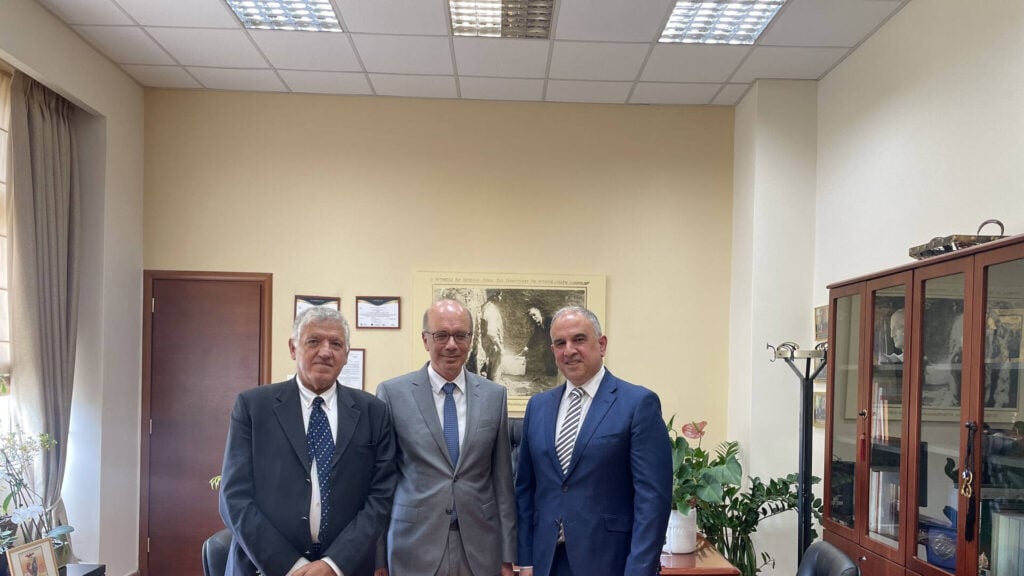Important initiatives aimed at further strengthening the ties between Australia and Greece in and through Medicine were at the centre of discussions during a meeting between Dr. Marinis Pirpiris, President of the Hellenic Medical Society of Australia (HMSA), and Dr Konstantinos Pantos with Dr Nikolaos Arkadopoulos, President of the Medical School of the National and Kapodistrian University of Athens.
The meeting addressed the topic of mutual recognition of medical degrees between the two countries, an issue that the Greek government intends to examine, provided that the corresponding initiative for doctors of Greek origin from the US has a positive result, as recently pointed out by the Minister of Health, Adonis Georgiadis.
The recognition of medical degrees for Greeks in the US has been voted on by Parliament, with Georgiadis speaking at the time of a “pilot provision”.
He said that with the recognition of medical qualifications and specialties by the US, “we will match exactly what exists in Greece.”
For example, if a doctor of Greek origin has a medical degree and a license to practice as a Pathologist, he will be recognised as a pathologist in Greece.
The minister added that, regarding specialisations, they have had no legislative authorisation but that too is changing.
“We are not bringing something we do not have, but we are corresponding to something we have,” he said.
Georgiadis acknowledged that “normally we could include (in the arrangement) Canada, possibly, we could also include Australia” among the countries from which the degrees and specialisations of Greek doctors would be recognised.
“I won’t hide from you that these things are in our minds to be done,” he said.
“But they want the corresponding work (like what was done with the US) that hasn’t been done. If we see that this (the recognition of qualifications by the US) ‘works’ and has an effect, I’m telling you right now that the government will move forward with something like this” for Australia and Canada as well.
THE MEETING
In a post on his LinkedIn page regarding the meeting, Dr Pirpiris noted “it was a great pleasure to meet with Professor Nikolaos Arkadopoulos … to promote important initiatives aimed at strengthening clinical and academic ties between Australia and Greece.”
The meeting, as mentioned above, was also attended by Dr Konstantinos Pantos, who, as Dr Pirpiris mentioned, is a renowned expert in assisted reproduction and in vitro fertilisation.
Dr Pantos grew up in Melbourne and completed his medical studies and his doctorate at the University of Athens, while he carried out postdoctoral research at the Royal Women’s Hospital in Melbourne.
“Our discussions focused on reciprocal recognition of medical degrees, the awarding of honorary academic titles, and the launch of undergraduate and postgraduate exchange programs,” Dr Pirpiris said.
He stated the initiatives will promote knowledge sharing, access to cutting-edge medical technologies, and the adoption of international best practices.
Likewise, they will also foster research collaborations, open pathways to international funding and publications, and support the modernization of healthcare – particularly in rural and remote areas.
Dr Pirpiris further highlighted that the programs also offer a unique opportunity for doctors from the Greek diaspora to reconnect with their heritage while contributing meaningfully to Greece’s healthcare system, gaining valuable exposure to diverse healthcare settings and systems.
“Ultimately, these initiatives aim to reverse brain drain, improve healthcare access, and strengthen ties between Greece and its global communities,” his post concluded.
It is noted that Georgiadis had also told Greek parliament that the benefit for Greece would be twofold.
Firstly, in relation to the “brain gain” – as many doctors from abroad of Greek origin have expressed interest in working in Greece – “if they didn’t have the huge bureaucracy”.
The minister stressed that the return of even 10-15 per cent of doctors would benefit them greatly in terms of generally increasing the number of doctors in the country but also in the “osmosis” between the US and Greece, in terms of medicine.
An osmosis that can and should also extend between Australia and Greece, we would add.
Secondly, in relation to the “smaller picture”, Georgiadis added that several expatriates, who come to Greece for vacation in the summer, say that they would do up to five shifts if they could, just to see what the system is like and decide whether they ultimately want to return.








